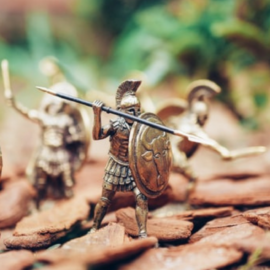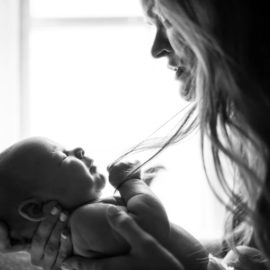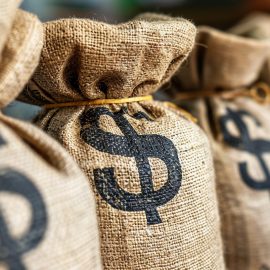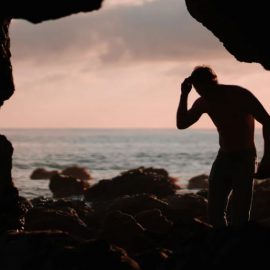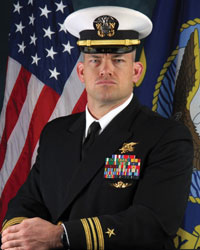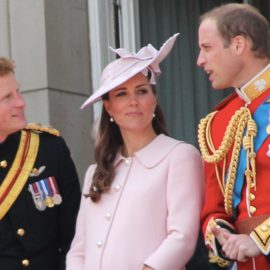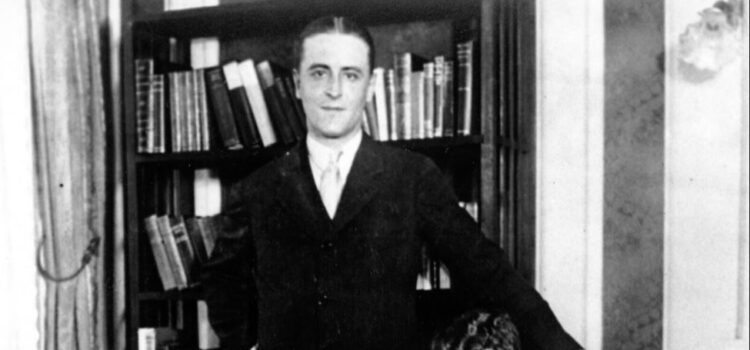
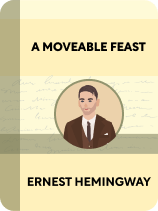
This article is an excerpt from the Shortform book guide to "A Moveable Feast" by Ernest Hemingway. Shortform has the world's best summaries and analyses of books you should be reading.
Like this article? Sign up for a free trial here .
How did F. Scott Fitzgerald and Ernest Hemingway know each other? What was their friendship like?
F. Scott Fitzgerald and Ernest Hemingway met and became good friends in Paris. The friendship was difficult on Hemingway because Fitzgerald was unstable and an alcoholic, but he stuck by his side nonetheless.
Here’s what Hemingway wrote about his friendship with Fitzgerald in A Moveable Feast.
Hemingway on Fitzgerald
Hemingway spends much of the book A Moveable Feast describing his encounters with F. Scott Fitzgerald, the novelist’s problems with alcohol, and his writing—Hemingway considered The Great Gatsby to be great literature.
F. Scott Fitzgerald and Ernest Hemingway first met in a café. Fitzgerald was accompanied by Dunc Chaplin, who was a pitcher for the Princeton Baseball Team. Fitzgerald had a boyish face with wavy hair and a high forehead. His eyes were friendly and his mouth looked like a woman’s. Fitzgerald praised Hemingway’s work to Chaplin.
As they drank, Fitzgerald began asking Hemingway questions about his personal life, like whether he had sex with his wife before they were married. Hemingway said he didn’t remember, but Fitzgerald continued to press him. At this point, Fitzgerald’s face started to tighten, and he suddenly looked very ill. Hemingway was alarmed and said they should get him to a doctor, but Chaplin said Fitzgerald always looked this way when he drank. The next time Hemingway saw him, Fitzgerald acted as though everything were normal, and alcohol didn’t affect him strangely, although he appeared to be remembering a different night than the one he had spent with Hemingway.
Another time, Fitzgerald discussed the faults of his earlier books with Hemingway—his insistence that they were no good led Hemingway to believe that his latest book, The Great Gatsby, was very good. Fitzgerald said the book wasn’t selling, but he had heard that there were good reviews. He was happy with the book, but upset that it wasn’t selling well. When it came to writing stories, Fitzgerald often revised them to make them commercially viable. Hemingway was horrified by this, and he called it whoring. He wanted Fitzgerald to simply focus on writing the best stories that he could.
Fitzgerald and Hemingway Go to Lyon
As their friendship developed, Fitzgerald asked Hemingway to go with him to Lyon to pick up his car, which his wife Zelda had left there during a bad rainstorm. They intended to go down by train, but Fitzgerald missed the train, forcing Hemingway to go alone and wire him from Lyon. Hemingway was frustrated to be spending his money, but at this point, he was in better financial shape than usual, as he was selling a book of short stories and getting paid regularly for his work. Nevertheless, he was saving up to go to Spain with Hadley.
Hemingway learned that Fitzgerald had left for Lyon, but couldn’t find him, even after calling the hotels. So he wandered around Lyon and met a fire-eater with whom he had dinner at a cheap place that served Algerian food. The fire-eater told Hemingway that he could find him wild and debaucherous stories to write, but it was getting late, so Hemingway paid for the meal and left to check on Fitzgerald.
He still couldn’t find him, so he went to bed. In the morning, Fitzgerald managed to track him down, apologizing for missing the train and noting that Zelda wasn’t well. They had breakfast together. Fitzgerald looked as though he’d been drinking, but told Hemingway he didn’t drink in the morning. Nonetheless, they both had a drink and felt better.
When they retrieved the car, Hemingway noticed it didn’t have a top. Fitzgerald explained that Zelda hated tops on cars and had it removed. But as they drove back to Paris, they kept getting waylaid by rain. Fitzgerald began worrying about getting “congestion of the lungs,” which he knew people died of. Hemingway told him this was just pneumonia by a different name, but Fitzgerald insisted that it was different and only found in Europe.
When they reached a small town late that evening and booked a hotel room, Fitzgerald told Hemingway he feared getting sick and dying only because he didn’t know who would take care of Zelda and his son if he died. Hemingway was having enough trouble looking after his own wife and son, but he told Fitzgerald he’d try to help out if necessary. Fitzgerald became increasingly paranoid that he had pneumonia, even though Hemingway assured him that he was fine.
Most alcoholics did die of pneumonia at that time, but at this point, Fitzgerald wasn’t so much a drunk as he was strangely affected by alcohol. Hemingway sent out for a thermometer, but the pharmacy was closed, and Fitzgerald grew increasingly incensed, blaming the waiter on duty and complaining about the French, whom he hated.
The waiter managed to find a thermometer that went under the arm, so Hemingway attended to Fitzgerald, taking his pulse, which was normal, and his temperature, which was also normal. While Fitzgerald went downstairs to call Zelda, Hemingway worried about how Fitzgerald would react to an actual illness if he did catch a cold.
They had a few drinks, and Fitzgerald began to talk about how he’d met Zelda and about their long courtship. Hemingway found Zelda’s affairs with other men during the courtship sad because of their effect on Fitzgerald. At their dinner, Fitzgerald passed out at the table—but without making too much of a show of it—and Hemingway and the waiter got Fitzgerald back up to the room.
Fitzgerald’s Drinking Problem
The day had made it clear to Hemingway that Fitzgerald really shouldn’t be drinking, and that Hemingway wasn’t doing a good job of caring for him.
The next day, though, Fitzgerald was cheerful, and they made their way back to Paris. At meals, Hemingway tried to set an example of moderation by ordering only very light wine, explaining to Fitzgerald that he couldn’t drink anymore because he was getting ready to write.
When Hemingway got back to Paris, he was incredibly happy to see his wife and excited to go to Spain with her—Hemingway decided he didn’t want to go on any more trips with anyone he didn’t love. However, once he read The Great Gatsby, Hemingway was so impressed with Fitzgerald’s talent that he vowed to continue being Fitzgerald’s friend and trying to help him so Fitzgerald could keep writing.
When Hemingway met Zelda back in Paris, he saw how much of a negative influence she was on Fitzgerald, and realized the odds were very long against Fitzgerald continuing to produce great literature.
Scott and Zelda Fitzgerald
Fitzgerald invited Hemingway and Hadley to have lunch with him and Zelda at their flat. The place was dark and depressing, and it didn’t look at all personalized, aside from some books and a ledger that Fitzgerald showed them listing all of his published stories and the amounts he’d been paid for them.
Zelda and Fitzgerald argued about drinking—Zelda was hungover, and she was annoyed that Fitzgerald had abstained from alcohol in order to focus on his writing. She was outwardly pleasant, but under the surface didn’t seem altogether happy at the lunch, which was not very tasty. But their daughter was cute and spoke in a cockney English accent because she had a nanny who did so.
Hemingway soon realized that Zelda was jealous of Scott’s writing—she tried to get him to drink so he couldn’t write; he tried to abstain so that he could. Scott was also jealous of Zelda, especially of her past relationships and the parties she went to. They both got drunk so often that Scott sometimes barely wrote at all.
Fitzgerald blamed Paris for his struggles to write and wanted Hemingway and Hadley to go out to the Riviera with them in the summer, as he thought this could fix his writing funk. Fitzgerald was still frustrated that Gatsby wasn’t selling well, so he concentrated on writing marketable stories, while Hemingway tried to persuade him to write more novels like Gatsby. At this point though, Fitzgerald remained mostly cheerful, and even when he wasn’t, he could poke some fun at himself.
Over the summer, Hemingway followed through on his plan to go to Spain with Hadley, and he started a novel there. (Shortform note: The novel was The Sun Also Rises, published in 1926.)
When he returned to Paris, he found that Fitzgerald had gone with his family to Cap d’Antibes on the Riviera (a peninsula in the South of France near Nice) and had begun drinking heavily again. Fitzgerald stopped caring that he wasn’t working and started getting drunk during the day. He occasionally was sober and writing, but when he was drunk, he found Hemingway and tried to get him to stop his own writing. However, Fitzgerald remained an intensely loyal friend when sober.
While Hemingway was working in Austria, Fitzgerald invited Hemingway and Hadley to stay with them in the Pyrenees, where Fitzgerald promised there wouldn’t be too much drinking and they could all write. Hemingway agreed and found it to be a pleasant place to write. Fitzgerald and Zelda both looked healthy—he had some money coming in, and they didn’t drink too heavily.
Nonetheless, Fitzgerald didn’t write anything good again until he learned from doctors that Zelda was mentally ill. (Shortform note: Zelda was diagnosed with schizophrenia in April of 1930 and institutionalized.)
The Louvre
This section begins with a conversation between Hemingway and Fitzgerald at a restaurant, and it concludes by jumping ahead in time to Hemingway’s reminiscences about Fitzgerald after his death, when Hemingway had returned to visit Paris after World War II.
One day over lunch at a restaurant, Fitzgerald revealed that something was bothering him—he was worried about his “measurements,” or the size of his penis. Zelda had told him that his “measurements” couldn’t please a woman. Hemingway took a look in the restaurant bathroom and reassured him that he was fine. Further, he said they should go to the Louvre and look at the statues so Fitzgerald could see that he was normal in comparison. When Fitzgerald remained doubtful, Hemingway commented that Zelda was trying to destroy him and was insane. Fitzgerald snapped back that Hemingway didn’t know Zelda, and Hemingway dropped the subject.
Many years later, the head chef at the Ritz Bar, Georges, asked Hemingway to tell him about Fitzgerald, who had recently died. Patrons asked Georges about Fitzgerald often, as they knew that Fitzgerald had frequented the bar, but Georges didn’t remember him. While talking to Georges, Hemingway realized that, along with Fitzgerald, most of the people he had known while he was a young man in Paris were dead. They were literary giants, and so Hemingway promised Georges that he would write about his time in Paris and describe Fitzgerald as he remembered him.

———End of Preview———
Like what you just read? Read the rest of the world's best book summary and analysis of Ernest Hemingway's "A Moveable Feast" at Shortform .
Here's what you'll find in our full A Moveable Feast summary :
- Ernest Hemingway's autobiography about his life in Paris between 1921 and 1926
- How Hemingway knew so many other great authors of the time
- Why F. Scott Fitzgerald was a toxic yet valuable friend to Hemingway

